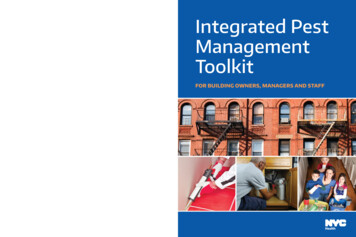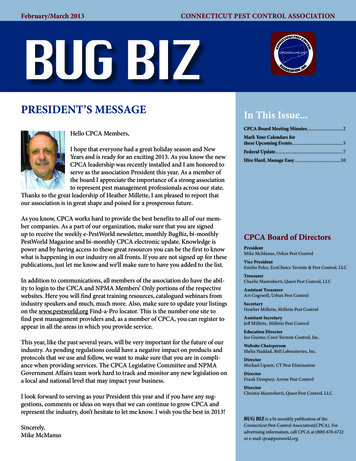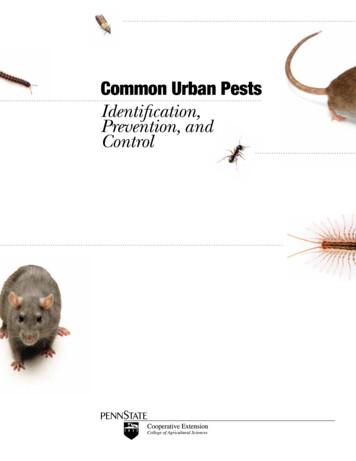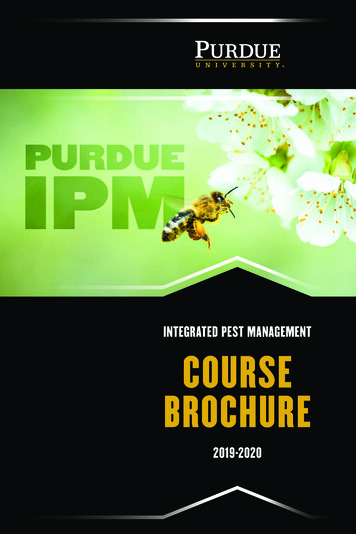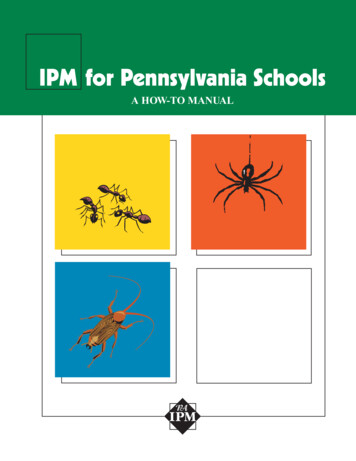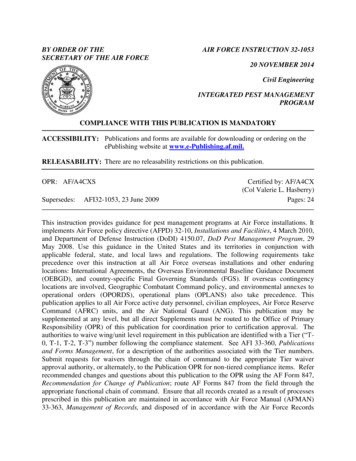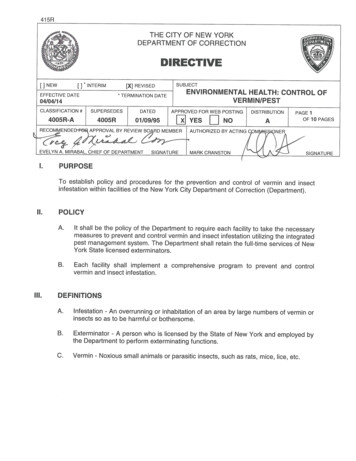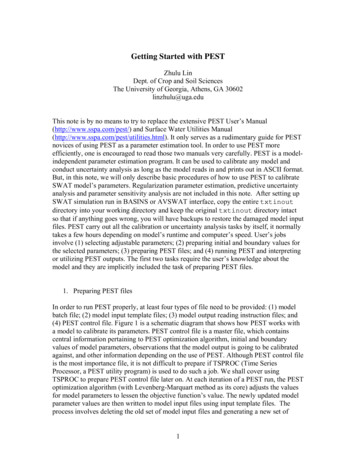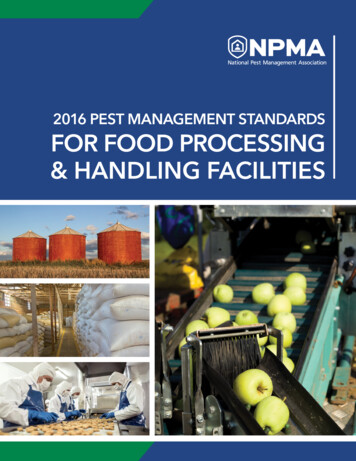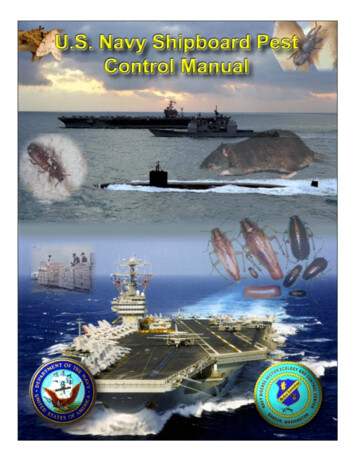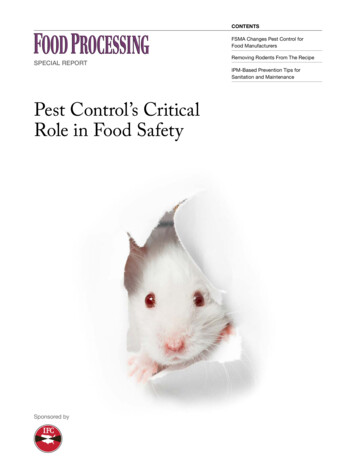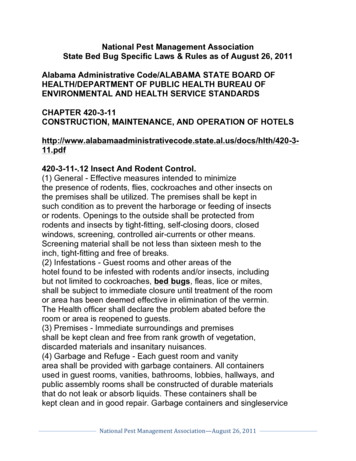
Transcription
National Pest Management AssociationState Bed Bug Specific Laws & Rules as of August 26, 2011Alabama Administrative Code/ALABAMA STATE BOARD OFHEALTH/DEPARTMENT OF PUBLIC HEALTH BUREAU OFENVIRONMENTAL AND HEALTH SERVICE STANDARDSCHAPTER 420-3-11CONSTRUCTION, MAINTENANCE, AND OPERATION OF l.us/docs/hlth/420-311.pdf420-3-11-.12 Insect And Rodent Control.(1) General - Effective measures intended to minimizethe presence of rodents, flies, cockroaches and other insects onthe premises shall be utilized. The premises shall be kept insuch condition as to prevent the harborage or feeding of insectsor rodents. Openings to the outside shall be protected fromrodents and insects by tight-fitting, self-closing doors, closedwindows, screening, controlled air-currents or other means.Screening material shall be not less than sixteen mesh to theinch, tight-fitting and free of breaks.(2) Infestations - Guest rooms and other areas of thehotel found to be infested with rodents and/or insects, includingbut not limited to cockroaches, bed bugs, fleas, lice or mites,shall be subject to immediate closure until treatment of the roomor area has been deemed effective in elimination of the vermin.The Health officer shall declare the problem abated before theroom or area is reopened to guests.(3) Premises - Immediate surroundings and premisesshall be kept clean and free from rank growth of vegetation,discarded materials and insanitary nuisances.(4) Garbage and Refuge - Each guest room and vanityarea shall be provided with garbage containers. All containersused in guest rooms, vanities, bathrooms, lobbies, hallways, andpublic assembly rooms shall be constructed of durable materialsthat do not leak or absorb liquids. These containers shall bekept clean and in good repair. Garbage containers and ugust26,2011
liners shall be provided in kitchenette areas.Author: Ronald Dawsey, Tim HatchStatutory Authority: Code of Ala. 1975, §§22-2-2, 34-15-3.History: Filed September 1, 1982. Repealed and Replaced:Effective March 26, 1993. Amended: December 20, 2006; effectiveJanuary 24, 2007.Arizona Revised Codehttp://www.azleg.gov/ars/36/00601.htmA. The following conditions are specifically declared public nuisancesdangerous to the public health:7. The presence of ectoparasites such as bedbugs, lice, mites and othersin any place where sleeping accommodations are offered to the public.B. If the director has reasonable cause to believe from informationfurnished to the director or from investigation made by the director that anyperson is maintaining a nuisance or engaging in any practice contrary tothe health laws of this state, the director shall promptly serve on thatperson by certified mail a cease and desist order requiring the person, onreceipt of the order, promptly to cease and desist from that act. Withinfifteen days after receipt of the order, the person to whom it is directed mayrequest the director to hold a hearing. The director, as soon as practicable,shall hold a hearing, and if the director determines the order is reasonableand just and that the practice engaged in is contrary to the health laws ofthis state, the director shall order the person to comply with the cease anddesist order.C. If a person fails or refuses to comply with the order of the director, or if aperson to whom the order is directed does not request a hearing and failsor refuses to comply with the cease and desist order served by mail undersubsection B, the director may file an action in the superior court in thecounty in which a violation occurred, restraining and enjoining the personfrom engaging in further acts. The court shall proceed as in other 6,2011
for injunctions.33-1319. Bedbug control; landlord and tenant obligations; definitionshttp://www.azleg.gov/ars/33/01319.htmA. A landlord has the following obligations with respect to a bedbuginfestation:1. The landlord shall provide bedbug educational materials to existing andnew tenants. Educational materials may include:(a) A description of measures that may be taken to prevent and controlbedbugs.(b) Information about bedbugs, including a description of their appearance.(c) A description of behaviors that are risk factors for attracting bedbugssuch as purchasing renovated mattresses, using discarded mattresses andfurniture, using used or leased furniture, purchasing pre-owned clothingand traveling without proper precautions.(d) Information provided by the United States centers for disease controland prevention and other federal, state or local health agencies.(e) Information provided by federal, state or local housing agencies.(f) Information provided by nonprofit housing organizations.(g) Information developed by the landlord.2. The landlord shall not enter into any lease agreement with a tenant for adwelling unit that the landlord knows to have a current bedbug infestation.B. A tenant has the following obligations with respect to a bedbuginfestation:1. The tenant shall not knowingly move materials into a dwelling unit thatare infested with bedbugs.2. A tenant who knows of the presence of bedbugs shall provide 11
landlord written or electronic notification of the presence of bedbugs.C. This section does not limit any other rights, remedies and obligationsunder this chapter.D. The landlord and tenant of a single family residence are excluded fromthe provisions of this section.E. Except as specifically provided in this section, this section does notcreate a cause of action against:1. A landlord or a landlord's employees, officers, agents and directors by atenant or a tenant's guests for any damages caused by bedbugs.2. A tenant by a landlord for any damages caused by bedbugs.F. For the purposes of this section:1. "Bedbugs" means any insect in the genus cimex and its eggs.2. "Infestation" or "infested" means that the presence of bedbugs issufficient to materially affect the health and safety of tenants and theirguests.11-269.11. Prohibition on adopting landlord tenant bedbug 69-11.htmA. Except as provided in subsection B of this section the board ofsupervisors and any other person under the authority of the board ofsupervisors shall not adopt requirements by ordinance or otherwise forlandlords or tenants that relate to the control of bedbugs as defined insection 33-1319, other than the requirements prescribed by section 331319.B. The board of supervisors or a person under the authority of the board ofsupervisors may adopt requirements relating to the proper disposal of itemsthat are infested with bedbugs.9-500.31. Prohibition on adopting landlord tenant bedbug 6,2011
mA. Except as provided in subsection B of this section, a city or town shallnot adopt requirements by ordinance or otherwise for landlords or tenantsthat relate to the control of bedbugs as defined in section 33-1319, otherthan the requirements prescribed by section 33-1319.B. A city or town may adopt requirements relating to the proper disposal ofitems that are infested with bedbugs.Senate Bill 1306 – Enacted April 2011/Implemented July 1306h.pdfFlorida Revised Code/Title VI/Civil Practice and Procedure/Chapter 83Landlord and m?mode View%20Statutes&SubMenu 1&App mode Display Statute&Search String bedbugs&URL rd’s obligation to maintain premises.—The landlord at all times during the tenancy shall:(a) Comply with the requirements of applicable building, housing, andhealth codes; or(b) Where there are no applicable building, housing, or health codes,maintain the roofs, windows, screens, doors, floors, steps, porches, exteriorwalls, foundations, and all other structural components in good repair andcapable of resisting normal forces and loads and the plumbing inreasonable working condition. However, the landlord shall not be requiredto maintain a mobile home or other structure owned by the tenant.The landlord’s obligations under this subsection may be altered or 26,2011
in writing with respect to a single-family home or duplex.(2)(a) Unless otherwise agreed in writing, in addition to the requirementsof subsection (1), the landlord of a dwelling unit other than a single-familyhome or duplex shall, at all times during the tenancy, make reasonableprovisions for:1. The extermination of rats, mice, roaches, ants, wood-destroyingorganisms, and bedbugs. When vacation of the premises is required forsuch extermination, the landlord shall not be liable for damages but shallabate the rent. The tenant shall be required to temporarily vacate thepremises for a period of time not to exceed 4 days, on 7 days’ writtennotice, if necessary, for extermination pursuant to this subparagraph.2.Locks and keys.3.The clean and safe condition of common areas.4.Garbage removal and outside receptacles therefor.5. Functioning facilities for heat during winter, running water, and hotwater.(b) Unless otherwise agreed in writing, at the commencement of thetenancy of a single-family home or duplex, the landlord shall install workingsmoke detection devices. As used in this paragraph, the term “smokedetection device” means an electrical or battery-operated device whichdetects visible or invisible particles of combustion and which is listed byUnderwriters Laboratories, Inc., Factory Mutual Laboratories, Inc., or anyother nationally recognized testing laboratory using nationally acceptedtesting standards.(c) Nothing in this part authorizes the tenant to raise a noncompliance bythe landlord with this subsection as a defense to an action for possessionunder s. 83.59.(d)This subsection shall not apply to a mobile home owned by a tenant.(e)Nothing contained in this subsection prohibits the landlord 011
providing in the rental agreement that the tenant is obligated to pay costs orcharges for garbage removal, water, fuel, or utilities.(3) If the duty imposed by subsection (1) is the same or greater than anyduty imposed by subsection (2), the landlord’s duty is determined bysubsection (1).(4) The landlord is not responsible to the tenant under this section forconditions created or caused by the negligent or wrongful act or omissionof the tenant, a member of the tenant’s family, or other person on thepremises with the tenant’s consent.History.—s. 2, ch. 73-330; s. 22, ch. 82-66; s. 4, ch. 87-195; s. 1, ch. 90133; s. 3, ch. 93-255; s. 444, ch. 95-147; s. 8, ch. 97-95.Hawaii 2006 6/Bills/HCR36 SD1 .htmH.C.R. NO.36TWENTY-THIRD LEGISLATURE,2006H.D. 1STATE OF HAWAIIS.D. 1HOUSE CONCURRENTRESOLUTIONREQUESTING THE DEPARTMENT OF HEALTH TO WORK INCOOPERATION WITH THE STATE TOURISM LIAISON AND THEHAWAII HOTEL & LODGING ASSOCIATION IN RAISINGAWARENESS, EDUCATION, AND PREVENTION OF THE st26,2011
INCIDENCE OF BEDBUGS.WHEREAS, after nearly being eradicated six decades ago, bedbugsare appearing in growing numbers throughout the United States;andWHEREAS, the National Pest Management Association indicates theyhave received reports of bedbugs in forty-three states; andWHEREAS, changing pest control practices that favor non-toxicalternatives is believed to have contributed to the currentbedbug problem; andWHEREAS, increased world travel has also been a factor in there-emergence of bedbugs, which are easily transported in asuitcase and can survive for long periods without food; andWHEREAS, nationally, a number of hotels with bedbug problemshave had to deal with frustrated visitors and negativepublicity; andWHEREAS, Hawaii's visitor industry and residents alike aresusceptible to the increasing incidence of bedbugs and the costsrelated to their control and extermination; now, therefore,BE IT RESOLVED by the Senate of the Twenty-third Legislature ofthe State of Hawaii, Regular Session of 2006, the House ofRepresentatives concurring, that the Department of Health isrequested to work in cooperation with the State Tourism Liaisonand the Hawaii Hotel & Lodging Association in raising awareness,education, and prevention of the increasing incidence ofbedbugs; andBE IT FURTHER RESOLVED that the Director of Health is requestedto submit findings and recommendations to the Legislature notlater than twenty days prior to the convening of the RegularSession of 2007; andBE IT FURTHER RESOLVED that a certified copy of this ConcurrentResolution be transmitted to the Director of Health, the StateTourism Liaison, and the Hawaii Hotel & Lodging gust26,2011
Report Title:Bedbugs; Department of HealthIllinois Compiled LawsChapter documents/061000850K1.htm(610 ILCS 85/1) (from Ch. 114, par. 100a)Sec. 1. No owner or operator of a railroad shall permit any railroad car tobe dispatched for the transportation of or occupation by passengers unlesssuch cars is in a clean and sanitary condition and is free from cockroaches,body lice, bedbugs and other vermin.(Source: Laws 1949, p. 1243.)(610 ILCS 85/2) (from Ch. 114, par. s/061000850K2.htmSec. 2. Owners and operators of railroads shall require railroad carsused for the transportation of or occupation by passengers to be regularlycleaned and inspected and to be fumigated or otherwise treated to freethem from cockroaches, body lice, bedbugs and other vermin.(Source: Laws 1949, p. 1243.)(610 ILCS 85/3) (from Ch. 114, par. 100c)Sec. 3.Whoever violates this Act shall be guilty of a petty offense. The use ofany car for the transportation of or occupation by passengers when the caris not in a clean and sanitary condition or is not free from cockroaches,body lice, bedbugs and other vermin is a separate offense for each daysuch car is so used.(Source: P. A. tion—August26,2011
PROFESSIONS AND OCCUPATIONS(225 ILCS 235/) Structural Pest Control /022502350K10.15.htm(225 ILCS 235/10.15)(Section scheduled to be repealed on January 1, 2012)Sec. 10.15. Findings and Council report. The General Assemblymakes the following findings:(1) The quality of life for a growing number ofIllinois families has been impacted by a significant increase in bedbug (Cimex lectularius) infestations.(2) A joint EPA/CDC statement recognizes bed bugs asa pest of public health importance.(3) Bed bug infestations are increasing, aredifficult to abate, and pose a challenge to those affected by thoseinfestations.(4) There is a lack of public awareness about bedbug prevention, management, and control, necessitating the needfor education of consumers, tenants, landlords, property owners,and managers.(5) In April of 2009, the United StatesEnvironmental Protection Agency held its first National Bed BugSummit to solicit recommendations on dealing with the growingpublic nuisance of bed bugs; among the major recommendationsemanating from the summit was the importance of legislativesupport and better education about bed bugs for governments andelected officials.(6) It is in the public interest to study theincrease in bed bug infestations and make specificrecommendations for addressing this growing public nuisance.The Structural Pest Control Advisory Council 2011
convene a subcommittee to develop a report to the GeneralAssembly with recommendations on the prevention, management,and control of bed bug infestations. The report shall include, butnot be limited to, recommendations related to the availability ofeducation materials on bed bug prevention, management, andcontrol; proper transport, storage, and disposal of bed bug infestedmaterials; promote the development of effective treatmentmethods or options to eradicate bed bug infestation; andincreasing knowledge and awareness among tenants, landlords,and property managers and owners about preventing bed buginfestations.In addition to the members of the Structural Pest ControlAdvisory Council, the subcommittee may include: a representativeof a nonprofit organization, particularly one involved with tenantadvocacy issues; a representative of apartment associations; andstaff from the Illinois Housing Development Authority and theOffice of the Illinois Attorney General. The members of thesubcommittee shall serve without compensation for their duties orexpenses incurred with the work of the subcommittee.The Structural Pest Control Advisory Council shall issueits report to the General Assembly on or before December 31,2011. This Section is repealed on January 1, 2012.(Source: P.A. 96-1330, eff. 7-27-10.)Iowa Administrative RuleTITLE IV PUBLIC HEALTH/SUBTITLE 2 HEALTH-RELATEDACTIVITIES/CHAPTER 138 MIGRANT LABOR CAMPS/138.13 Conditionsfor permit.138.13 Conditions for permit.To be eligible for a permit, a migrant labor camp, or portion thereof, shallmeet each and all of the following requirements:10. Insect and rodent control.a. Effective measures shall be taken to control rats, mice, flies,mosquitoes; bedbugs , and all other insects, rodents, and parasites withinthe camp premises.b. Pesticides and pest control equipment shall be stored and used in asafe 6,2011
[C71, 73, 75, 77, 79, 81, §138.13]Kansas Administrative Rules/Article 36.—FOOD SERVICEESTABLISHMENTS, FOOD VENDING MACHINE COMPANIES ANDLODGING ESTABLISHMENTS/28-36-77. Guest rooms.http://www.kssos.org/pubs/KAR/2009/2A004 2A.pdf(p) Each guest room shall be free of any evidence of insects, rodents, andother pests.(1) If a guest room has been vacant for at least 30 days, the licensee shallvisually inspect that room for any evidence of insects, rodents, and otherpests within 24 hours of occupancy by the next guest.(2) No guest room that is infested by insects, rodents, or other pests shallbe rented until the infestation is eliminated.(3) The presence of bed bugs, which is indicated by observation of a livingor dead bed bug, bed bug carapace, eggs or egg casings, or the typicalbrownish or blood spotting on linens, mattresses , or furniture, shall beconsidered an infestation.(4) The presence of bed bugs shall be reported to the regulatory authoritywithin one business day upon discovery or upon receipt of a guestcomplaint.(5) All infestations shall be treated by a licensed pest control operator(PCO).(6) All pest control measures, both mechanical and chemical, shall be usedin accordance with the manufacturer’s recommendations.(7) No rodenticides, pesticides, or insecticides shall be stored in a guestroom or in any area that could contaminate guest supplies, food,condiments, dishware, or utensils.Maine Revised Statutes-Title 14: COURT PROCEDURE – CIVIL/ Part7: PARTICULAR PROCEEDINGS/Chapter 710: RENTAL Association—August26,2011
title14sec6021-A.pdf§6021-A. Treatment of bedbug infestation1. Definition. As used in this section, unless the context otherwiseindicates, "pest control agent" means a commercial applicator of pesticidescertified pursuant to Title 22, section 1471- ‐D.[ 2009, c. 566, §8 (NEW) .]2. Landlord duties. A landlord has the following duties.A. Upon written or oral notice from a tenant that a dwelling unit mayhave a bedbug infestation, the landlord shall within 5 days conduct aninspection of the unit for bedbugs. [2009, c. 566, §8 (NEW).]B. Upon a determination that an infestation of bedbugs does exist in adwelling unit, the landlord shall within 10 days contact a pest control agentpursuant to paragraph C. [2009, c. 566, §8 (NEW).]C. A landlord shall take reasonable measures to effectively identify andtreat the bedbug infestation as determined by a pest control agent. Thelandlord shall employ a pest control agent that carries current liabilityinsurance to promptly treat the bedbug infestation. [2009, c. 566, §8(NEW).]D. Before renting a dwelling unit, a landlord shall disclose to aprospective tenant if an adjacent unit or units are currently infested with orare being treated for bedbugs. Upon request from a tenant or prospectivetenant, a landlord shall disclose the last date that the dwelling unit thelandlord seeks to rent or an adjacent unit or units were inspected for abedbug infestation and found to be free of a bedbug infestation. [2009, c.566, §8 (NEW).]E. A landlord may not offer for rent a dwelling unit that the landlordknows or suspects is infested with bedbugs. [2009, c. 566, §8 (NEW).]F. A landlord shall offer to make reasonable assistance, includingfinancial assistance, available to a tenant who is not able to comply withrequested bedbug inspection or control measures under subsection 3,paragraph C. After first disclosing what the cost of the tenant's st26,2011
with requested bedbug inspection or control measures may be, a landlordmay charge the tenant a reasonable amount for any such assistance,subject to a reasonable repayment schedule, not to exceed 6 months,unless an extension is otherwise agreed to by the landlord and the tenant.[2009, c. 566, §8 (NEW).][ 2009, c. 566, §8 (NEW) .]3. Tenant duties. A tenant has the following duties.A. A tenant shall promptly notify a landlord when the tenant knows of orsuspects an infestation of bedbugs in the tenant's dwelling unit. [2009, c.566, §8 (NEW).]B. Upon receiving reasonable notice as set forth in section 6025,including reasons for and scope of the request for access to the premises,a tenant shall grant the landlord of the dwelling unit, the landlord's agent orthe landlord's pest control agent and its employees access to the unit forpurposes of an inspection for or control of the infestation of bedbugs. Theinitial inspection may include only a visual inspection and manualinspection of the tenant's bedding and upholstered furniture. Employees ofthe pest control agent may inspect items other than bedding andupholstered furniture when such an inspection is considered reasonable bythe pest control agent. If the pest control agent finds bedbugs in thedwelling unit or in an adjoining unit, the pest control agent may haveadditional access to the tenant's personal belongings as determinedreasonable by the pest control agent. [2009, c. 566, §8 (NEW).]C. Upon receiving reasonable notice as set forth in section 6025, atenant shall comply with reasonable measures to eliminate and control abedbug infestation as set forth by the landlord and the pest control agent.The tenant's unreasonable failure to completely comply with the pestcontrol measures results in the tenant's being financially responsible for allpest control treatments of the dwelling unit arising from the tenant's failureto comply. [2009, c. 566, §8 (NEW).][ 2009, c. 566, §8 (NEW) .]4. Remedies. The following remedies are available.A. The failure of a landlord to comply with the provisions of this sectionconstitutes a finding that the landlord has unreasonably failed under 11
circumstances to take prompt, effective steps to repair or remedy acondition that endangers or materially impairs the health or safety of atenant pursuant to section 6021, subsection 3. [2009, c. 566, §8 (NEW).]B. A landlord who fails to comply with the provisions of this section isliable for a penalty of 250 or actual damages, whichever is greater, plusreasonable attorney's fees. [2009, c. 566, §8 (NEW).]C. A landlord may commence an action in accordance with section6030- ‐A and obtain relief against a tenant who fails to provide reasonableaccess or comply with reasonable requests for inspection or treatment orotherwise unreasonably fails to comply with reasonable bedbug controlmeasures as set forth in this section. For the purposes of section 6030- ‐Aand this section, if a court finds that a tenant has unreasonably failed tocomply with this section, the court may issue a temporary order or interimrelief pursuant to Title 5, section 4654 to carry out the provisions of thissection, including but not limited to:(1) Granting the landlord access to the premises for the purposes setforth in this section;(2) Granting the landlord the right to engage in bedbug controlmeasures; and(3) Requiring the tenant to comply with specified bedbug controlmeasures or assessing the tenant with costs and damages related to thetenant's noncompliance.Any order granting the landlord access to the premises must be servedupon the tenant at least 24 hours before the landlord enters the premises.[2009, c. 566, §8 (NEW).]D. In any action of forcible entry and detainer under section 6001, thereis a rebuttable presumption that the action was commenced in retaliationagainst the tenant if, within 6 months before the commencement of theaction, the tenant has asserted the tenant's rights pursuant to this section.[2009, c. 566, §8 (NEW).][ 2009, c. 566, §8 (NEW) .]SECTION HISTORY2009, c. 566, §8 ,2011
LD 1198 – Signed June 22, 2011-Amended 2010 Bed Bug ls 125th/chappdfs/PUBLIC405.pdfSec. 9. 14 MRSA §6021-A, sub-§2, ¶F, as enacted by PL 2009, c.566, §8, is amended to read:F. A landlord shall offer to make reasonable assistance, includingfinancial assistance, available to a tenant who is not able to complywith requested bedbug inspection or control measures undersubsection 3, paragraph C. The landlord shall disclose to the tenantwhat the cost may be for the tenant's compliance with the requestedbedbug inspection or control measure. After first disclosing what thecost of the tenant's compliance with requested bedbug inspection orcontrol measures may be, amaking this disclosure, the landlord mayprovide financial assistance to the tenant to prepare the unit for bedbugtreatment. A landlord may charge the tenant a reasonable amount forany such assistance, subject to a reasonable repayment schedule, notto exceed 6 months, unless an extension is otherwise agreed to by thelandlord and the tenant. This paragraph may not be construed torequire the landlord to provide the tenant with alternate lodging or topay to replace the tenant's personal property.Sec. 10. 14 MRSA §6021-A, sub-§4, ¶D, as enacted by PL 2009, c.566, §8, is amended to read:D. In any action of forcible entry and detainer under section 6001, thereis a rebuttable presumption that the action was commenced inretaliation against the tenant if, within 6 months before thecommencement of the action, the tenant has asserted the tenant'srights pursuant to this section. The rebuttable presumption of retaliationdoes not apply unless the tenant asserted that tenant's rights pursuantto this section prior to being served with the eviction notice. There is nopresumption of retaliation if the action for forcible entry and detainer 1
brought for failure to pay rent or for causing substantial damage to thepremises.Minnesota Administrative CodeCHAPTER 4625, LODGING ESTABLISHMENTShttps://www.revisor.mn.gov/rules/?id 4625.1700&keyword type all&keyword bedbugs4625.1700 INSECT AND RODENT CONTROL.Every hotel, motel, lodging house, and resort shall be soconstructed and equipped as to prevent the entrance, harborage, orbreeding of flies, roaches, bedbugs, rats, mice, and all other insectsand vermin, and specific means necessary, for the elimination of suchpests such as cleaning, renovation, or fumigation shall be used. Thecommissioner may order the facility to hire an exterminator licensed bythe state to exterminate pests when:A. the infestation is so extensive that it is unlikely that anonprofessional can eradicate the pests effectively; orB. the extermination method of choice can only be carried out by alicensed exterminator; orC. upon reinspection, it is found that an establishment has not beenbrought into compliance with a prior order to rid the establishment ofpests.Statutory Authority:MS s 144.08; 144.12; 157.01 to 157.14; 327.10 to 327.67Posted: January 21, 2000https://www.revisor.mn.gov/rules/?id 4625.1700&keyword type all&keyword 6,2011
CHAPTER 4665, SUPERVISED LIVING FACILITIES4665.2300 INSECT AND RODENT CONTROL.Every facility shall be so constructed or equipped as to prevent theentrance, harborage, or breeding of flies, roaches, bedbugs, rats, mice,and all other insects and vermin. Cleaning, renovation, or fumigation bylicensed pest control operators for the elimination of such pests shallbe used when necessary.Statutory Authority:MS s 144.56Posted:October 11, 2007https://www.revisor.mn.gov/rules/?id 4665.2300&keyword type all&keyword bedbugsNevada Revised Code-CHAPTER 447 - PUBLIC Legal/LawLibrary/NRS/NRS-447.htmlNRS 447.030 Extermination of vermin. Any room in any hotel in thisstate which is or shall be infested with vermin or bedbugs or similar thingsshall be thoroughly fumigated, disinfected and renovated until such verminor bedbugs or other similar things are entirely exterminated.[3:136:1915; 1919 RL p. 2811; NCL § 3339]New York ?QUERYTYPE LAWS &QUERYDATA ADC27-2018.1 @TXADC027NationalPestManagementAssociation—
1. A landlord or a landlord's employees, officers, agents and directors by a tenant or a tenant's guests for any damages caused by bedbugs. 2. A tenant by a landlord for any damages caused by bedbugs. F. For the purposes of this section: 1. "Bedbugs" means any insect in the genus cimex and its eggs. 2.
